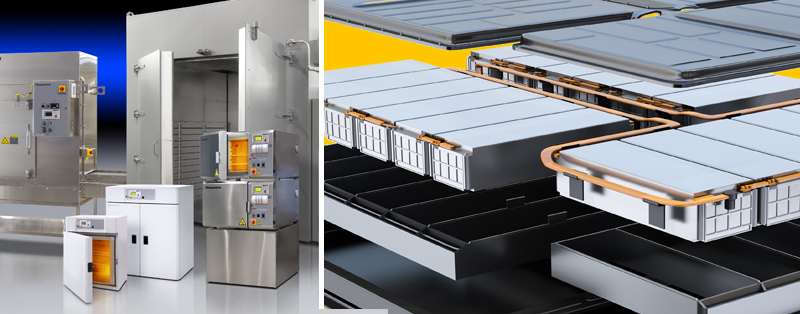Lithium-ion Battery Growth Drives Demand for Industrial Ovens

Battery technology is advancing at a rapid pace and the market for batteries is expanding due to a growing demand for electric vehicles, portable electronics, renewable energy storage and battery powered tools and equipment.
One of the main drivers of the battery market expansion is electric vehicle (EVs). In response to global warming, policies and incentives are being implemented to encourage adoption of electric vehicles. This has led to a surge in demand for lithium-ion batteries, which are most commonly used in EVs.
Increased investment and innovation in battery technology has led to new types of batteries, such as solid-state batteries and lithium-sulfur batteries. Advancements in battery technology has improved energy density, efficiency and sustainability making batteries a viable alternative to gas powered equipment and power tools.
Industrial Ovens for Battery Manufacturing
Despatch Industrial ovens are commonly used in the manufacturing of lithium-ion batteries for various applications. The thermal processing steps where industrial ovens are used include drying, curing, annealing, preheating, aging, and testing.
Drying: After coating the active materials onto the current collector, the electrode is dried to remove the solvent and create a dry electrode. The drying process typically involves heating the electrode to a temperature of 175-250ᵒF for several hours.
Curing: Industrial ovens are used for curing the adhesive used to bond the various components of the battery together. The ovens are designed to apply heat and pressure to the battery components to create a strong and durable bond between the components.
Annealing: Annealing is a process where the electrodes are heated to a specific temperature to improve their conductivity and adhesion to the current collector. The temperature and duration of the annealing process depend on the type of electrode material being used and the specific requirements of the battery.
Preheating: Industrial ovens are used for preheating the components of the battery before assembly. Preheating ensures that the components are at the correct temperature and eliminates any moisture that may be present, which can affect the battery's performance and safety.
Aging: The aging process involves subjecting the batteries to accelerated aging conditions to simulate the battery's performance and reliability over time. The aging process may involve subjecting the batteries to elevated temperatures or high currents to accelerate the aging process. The batteries are typically cycled during the aging process, and the capacity is measured periodically to evaluate their performance over time.
Testing: Temperature cycling tests are performed to evaluate the battery's performance and reliability under different temperature conditions. The battery is typically subjected to a series of temperature cycles, which involves ramping the temperature up and down between different temperature ranges.
Industrial ovens play a critical role in the manufacturing of lithium-ion batteries, as they are used for various thermal processing steps that are essential for creating high-performance and reliable battery cells. The ovens must be carefully designed, controlled, and optimized to ensure that they meet the specific requirements of the battery manufacturing process.

